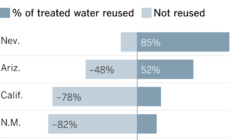-
Trump Mulls Iran Nuclear Talks While Preparing Military Strikes: Report - 2 mins ago
-
Moment Puppy Makes Her First Ever Friend in School Melts Hearts - 37 mins ago
-
Opinion | Syria Is Trying to Rebuild Without Humanitarian Aid or Sanction Relief - 44 mins ago
-
Is It Safe To Give Your Photos to ChatGPT for a Ghibli Edit? - about 1 hour ago
-
Val Kilmer: Three Memorable Movies to Stream - about 1 hour ago
-
Recycling more water would help fix Colorado River’s woes, report says - 2 hours ago
-
Houthi Video Shows Wreckage They Say Is Downed U.S. Drone - 2 hours ago
-
With Painful Layoffs Ahead, Agencies Push Incentives to Quit - 2 hours ago
-
Elon Musk Reacts To Losing Wisconsin Supreme Court Election - 2 hours ago
-
Opinion | What I Saw in China on the Eve of Trump’s ‘Liberation Day’ - 3 hours ago
Texas Pastor Says Bible Has ‘No’ Grounds for Being Anti-Transgender
The pastor of a Texas church says that the Bible never stipulates that Christians should be against transgender individuals.
“It’s #transdayofvisibility and this is your reminder that there are absolutely no ‘biblical’ grounds for being anti-trans,” pastor Zach Lambert of Restore Austin wrote Monday on X.
Why It Matters
Trans Day of Visibility (TDOV) falls annually on March 31, giving trans, non-binary, and gender-expansive youth and adults, as well as their allies, a voice during a period in American society where many of the estimated 3.3 million transgender adults are at risk due to various legislative policy that has come all the way from the president himself.
TDOV was established in 2010 by activist Rachel Crandall, according to the Gay & Lesbian Alliance Against Defamation, or GLAAD. The March events nationwide are more celebratory compared to the day of remembrance that takes place annually in November.
President Donald Trump has signed executive orders negatively affecting the transgender community, including one that would block hospitals and clinics that receive federal funding from providing gender-affirming care to people under the age of 19. Another more mainstream executive order has included banning transgender females from competing in female sports—a policy that is embraced by a large majority of Americans.
What To Know
Restore Austin is a church that officially launched during the Republican primaries in 2016, recently celebrating its ninth anniversary.
The church describes itself as a place for anyone to feel themselves, to embark “on a journey of restoration through Jesus who loves people without prejudice or qualification.”

Brandon Bell/Getty Images
Lambert told Newsweek that about 400 of the church’s 1,000 members show up on any given Sunday, with maybe 5-10 of those individuals being transgender.
“We’re a pretty typical Christian church,” Lambert said. “People came out of typical Evangelical bases. Most of them are not willing to compromise justice and inclusion and those things, but don’t want to get rid of faith in Jesus and the Bible. We help bring those things together.”
Lambert’s post mentions that zero Bible verses condemn trans folks, 33 verses welcome migrants, 429 advocate for peace, 714 talk about loving God and others, and over 2,000 talk about taking care of the poor.
He said that most of his posts on social media receive backlash from “external” critics rather than those directly involved with his congregation or even perhaps local officials.
There have been instances when Restore’s broad support for the LGBTQ+ community has resulted in other congregations and denominations in proximity cutting ties.
Restore is there for those who embrace different people of different backgrounds, Lambert said. Some join to push back against Christian nationalism; others may want to “deconstruct their faith” due to religious trauma.
As church attendance across the board nationally dwindles, Lambert stays staunchly devoted to his church’s values. That means following COVID-19 safety protocols, acknowledging movements like Black Lives Matter and other civil rights injustices, or just providing people with an opportunity to find shared values in their community.
Lambert, who is 36, said the members typically range 10 years on either side of him. While there are teenagers and 80-year-olds who show up, the largest concentration is Generation Z and millennials.
“I think it’s because we’re doing something purposely different,” he said. “It’s not post-Christian; there’s a lot of communities that exist that are spiritual but not religious. We’re doing something unapologetically Christian but also unapologetically inclusive. It’s increasingly rare.”
Lambert’s church opened at a time of political turmoil, which has lent itself toward theological disagreements in segments of the country. While Austin, like other Texas cities including Dallas, Houston or San Antonio, are more progressive, the state still has some of the most anti-transgender legislation across the U.S.
Earlier this year, a conservative lawmaker in the state introduced a bill that could make it a felony for transgender people to identify their gender differently from their sex assigned at birth on official documents with government entities or employers, potentially leading to jail time.
“Watching what Trump has done to conservatism more broadly, turning his back on more traditional conservative values, has been quite the thing to behold,” Lambert said. “We have a lot of conversative folks who think there’s no place for them in religious circles anymore.”
What People Are Saying
X user Megan Basham on Lambert’s post: “Wicked serpent, encouraging people into hell.”
What Happens Next
In 2025, 42 anti-trans bills have passed.
Source link
























